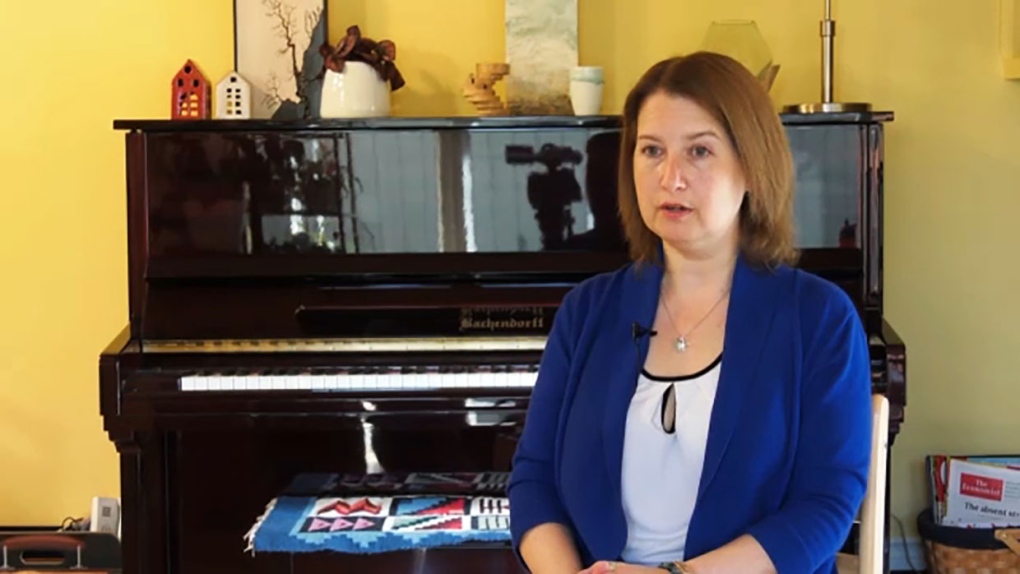Early screening: Cancer patients call on province to pave way for early breast cancer screening
When Colleen Packer was 41 years old, she was exhausted.
She went to see her doctor, unsure of exactly what was wrong but knowing something was off.
She says after an examination and blood test, her doctor told her she needed more Vitamin D.
Packer asked about getting a mammogram but says she was told it wasn't necessary.
Four years later, she was back at the doctor's office, this time with pain in her breasts.
A mammogram revealed she had breast cancer and likely had for several years. It had already metastasized throughout her body.
"Had I been able to get that screening at age 40, and had regular screening there is a strong likelihood it would have been caught at an early stage and treated and I would've had a much longer life expectancy and a much different life than I have now," she says.
 When she was 41, Colleen Packer asked about getting a mammogram but says she was told it wasn't necessary. Four years later, she got one. The mammogram revealed she had breast cancer - and likely had for several years. It had already metastasized throughout her body.
When she was 41, Colleen Packer asked about getting a mammogram but says she was told it wasn't necessary. Four years later, she got one. The mammogram revealed she had breast cancer - and likely had for several years. It had already metastasized throughout her body.
NOT RECOMMENDED
In Canada, mammograms aren't routinely recommended for people under the age of 50 who aren't deemed to be at-risk of developing cancer.
That's based on the Canadian national breast cancer screening study, which was conducted in the 1980s.
It determined that breast cancer death rates weren't significantly affected by early screening of people under the age of 50.
However, many experts have criticized that finding, and a study published last winter suggested the methodology was flawed and people in their 40s should be eligible for mammograms, even if they don't have common symptoms or a family history of breast cancer.
Some provinces allow people over the age of 40 to self-refer for mammograms, however, Alberta does not.
In this province, a doctor's referral is still required.
CTV asked health minister Jason Copping why that is still the case. Copping said he'll look into it.
"It's just another example of your postal code determining your ability to access the treatment, your postal code determining in my case your life expectancy," says Packer, "because if I'd been referred for screening early on my life expectancy is not what it could've been."
Packer says she tries not to let cancer overwhelm her life, even though it will always be with her.
She also tries not to think how an early diagnosis could've changed things.
"It's hard not to be bitter at times for sure because the life I'm living now is not the life I thought I would live so that is hard," she says, "I refuse to let cancer dictate everything so I'm making the most of what I can do."
Packer says that includes encouraging women to advocate for themselves and push for cancer screening when they want it - and before it's too late.
CTVNews.ca Top Stories

Canada, G7 urge 'all parties' to de-escalate in growing Mideast conflict
Canada called for 'all parties' to de-escalate rising tensions in the Mideast following an apparent Israeli drone attack against Iran overnight.
'It could be catastrophic': Woman says natural supplement contained hidden painkiller drug
A Manitoba woman thought she found a miracle natural supplement, but said a hidden ingredient wreaked havoc on her health.
After hearing thousands of last words, this hospital chaplain has advice for the living
Hospital chaplain J.S. Park opens up about death, grief and hearing thousands of last words, and shares his advice for the living.
'It was all my savings': Ontario woman loses $15K to fake Walmart job scam
A woman who recently moved to Canada from India was searching for a job when she got caught in an online job scam and lost $15,000.
Families to receive Canada Child Benefit payment on Friday
More money will land in the pockets of some Canadian families on Friday for the latest Canada Child Benefit installment.
After COVID, WHO defines disease spread 'through air'
The World Health Organization and around 500 experts have agreed for the first time on what it means for a disease to spread through the air, in a bid to avoid the confusion early in the COVID-19 pandemic that some scientists have said cost lives.
American millionaire Jonathan Lehrer denied bail after being charged with killing Canadian couple
American millionaire Jonathan Lehrer, one of two men charged in the killings of a Canadian couple in Dominica, has been denied bail.
DEVELOPING G7 warns of new sanctions against Iran as world reacts to apparent Israeli drone attack
Group of Seven foreign ministers warned of new sanctions against Iran on Friday for its drone and missile attack on Israel, and urged both sides to avoid an escalation of the conflict.
Prince Harry formally confirms he is now a U.S. resident
Prince Harry, the son of King Charles III and fifth in line to the British throne, has formally confirmed he is now a U.S. resident.

































